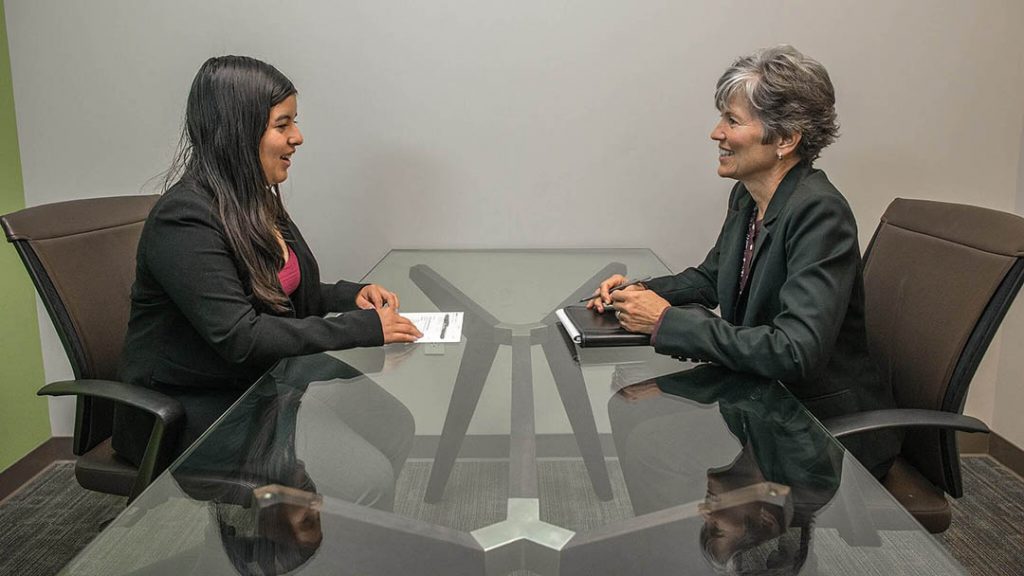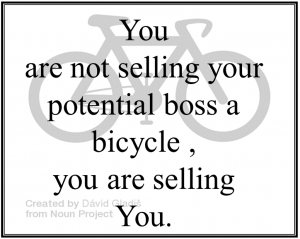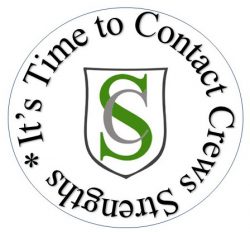Blog
It’s Time to Put Your Strengths to Work for Your Interview – Part 4
Personality Questions: What You Know Begins to Meet Who You Are

My last article about interviews began to address questions about you as an individual versus you as a collection of skills. Opinion, quirky and stress type questions were covered in that last article. Two other important varieties of individual questions are personality and behavior questions. This post discusses personality questions. Behavior questions will be addressed in the next post.
Personality questions relate to who you are and how you relate and react to the world around you. One major factor that gets you hired is convincing the interviewer that she can stand to deal with you on a regular basis. Will the interviewer look forward to having you report to him several times a week? Are your personalities likely to compliment or clash? Can you perform at a level that leads to the department’s success.
Job seekers tend to concentrate on experience and training, thinking that the most experienced and best credentialed applicant gets the job. However, the truth is that work success is often about the ability to learn, adapt, think, support, and get along. Your behavior will tend to have a greater influence on your success in most jobs than your degree or years performing some similar task.
Don’t get me wrong. Skills matter. You are not likely to get a job as an airline pilot, unless you have massive amounts of experience flying airplanes. Surgeons need to know their way around arteries, kidneys, and adenoids.
Success in a job though is also about a different collection of abilities. Personality questions tend to delve into your behavior and performance, rather than just your professional background and experience.
Greatest Strength / Worst Weakness
The two questions that are most likely to come to mind of this type are “What is your greatest strength?” and “What is your worst weakness?” Most candidates kind of love the first one and hate the second. The reality is that the successful answers to these questions are less about the superlative and more about a balanced and realistic understanding of who you are.
Your answer to the first question does not have to be your absolute greatest strength. Instead, it should be your greatest strength that relates to the job for which you are interviewing. If you have a great sales record and you are an outstanding judge of people, consider which one aligns best with the available position. If the job you are interviewing for is in sales, then that should be your greatest strength (at least at that moment). When the sales manager’s job comes up, your people insights might be more important. This isn’t deceitful. Trust me. No one will come back a year into the job and say, “Well you are a great salesperson, but now we discover you are also very good at developing a sales force. You’re fired.”

Dealing with the weakness question requires a little finesse. The old recommendation was to answer the weakness question with something along the lines of “I work too hard.” Any HR person or manager who has hired one employee can see through that before you get the word “too” out.
As a Gallup Certified Strengths Coach, I know that our strengths and weaknesses frequently align on the same axis. You pay great attention to detail, but that can lead you to lose sight of the big picture. You care deeply about people and want them to feel wanted and welcome, which can make it hard for you to correct or discipline them. You are a hard worker, who judges success by completing lists of tasks, which means you can get too far out in front of my team.
That sort of self-evaluation can help answer the weakness question in a way that puts you in the best possible light. To do so, it is necessary to close this loop, to describe how your self-awareness has given you insight in compensating for your weakness. For instance, “I pay great attention to detail, but that can lead me to loss sight of the big picture. Understanding that, I set aside time each week to review what the departmental plans and goals are. Doing that and discussing the big picture with my manager has helped me understand that the details I love are part of something bigger. This has helped me still be effective with detail work, but not so much so that I let the minutia take over for the important.”
Example Personality Quesitons
Here are some Personality type questions and some suggestions for how to answer them. As always, the best idea is to answer them truthfully, but not exhaustively. The interviewer is trying to get the flavor of the person on the other side of the table. Do not overwhelm them.
What do you do when you are not working? (What are your hobbies, outside interest, . . . ).

When answering this question, your answer should be authentic. Lying to seem to share an interest with the interviewer is likely to be discovered in the next one or two questions the interviewer is likely to ask. For instance, you claim to be a golfer when the reality is you don’t know a birdie from a sand trap. If the interviewer knows even the slightest bit more than you about golf, you have marked yourself as untrustworthy. Unless the job you are applying for requires great amounts of daring and bravery, perhaps keep your skydiving to yourself. If you are lucky enough to actually be in someone’s office and can see something like a picture of the interviewer involved in an activity that you actually do participate in, like bicycling, then absolutely share that. However, do not let yourself be drawn into an argument about the superiority of side-pull over center-pull brakes. You are not selling your potential boss a bicycle , you are selling you.
Tell me about yourself.
The interviewer’s opening, “Tell me about yourself”, can be an invitation for you to soar or crash. Your answer needs to be predominantly about your work, your career, your work ethic. Where you grocery shop, your shoe size, your second dog’s name are details to save for never. Consider a quick career synopsis including why you do what you do. “After I earned my nursing degree, I worked in the emergency room at XYZ Hospital for almost 5 years. I learned a great deal there but decided that ICU nursing was more closely aligned with my skills and temperament. In fact, I originally decided to go into nursing because of the excellent care I received during a childhood illness and long hospital stay.” This answer relates to the work, covers your career path while emphasizing the importance that your work has to you.
Where do you want to be in X years? Or, what is your career goal?
The right answer is something that relates to the current position, shows some ambition but doesn’t indicate your plan to usurp the role which your interviewer currently holds. Answering this question can also give you an opportunity to discuss your desire to solve the department’s problems with customer acquisition, logistics, shrinkage, whatever and helped the interviewer in her continued meteoric rise in the company.



If your homework indicates that the role you are interviewing for is an up or out job, assure them that you will be among those who continue to grow with the organization. If you are nearer to the end of your career, answers that indicate your desire to make an impact in your final role can be acceptable.

Knowing as much about the position, why it is open, career paths in the organization, etc., can help you craft authentic answers. However, it is mandatory that your answers describing how you goal will be achieved through the position for which you are interviewing.
What is your greatest achievement?

You may legitimately believe your greatest achievement is raising two healthy and happy kids. However, that is not what the question you are being asked is looking for. The question is related to what you will do for the interviewer. Now you might say something like, “I am most proud of how I took care of my mother during the last 3 years of her life and successfully performed my role at ABC company. I miss her now that she is gone, but I can only imagine how much more I will be able to do for you without that concern taking up so much of my energy”.
If you are only few years out of college, answers about graduating Sigma Cum Laude are acceptable. If you have 24 years of work experience, you better have something else to be your number one achievement. It would not hurt your prospects if at least for the moment you were in the interview, you were able to convince the interviewer that your greatest achievement was increasing sales for your last company, year over year by 8.7342%. Especially if increasing sales appears to be a major part of the role you are trying to get. Since you are describing your greatest achievement, you probably need more than one sentence to describe it. Your huge sale increase probably deserves a brief description of how you did it.
Answers to personality questions are about you, but just like every other question in an interview, the you that you are presenting needs to be the you they need to hire. If the job is right for you at the point you are at in your career, then you should be able to help them connect you to that opening.
Thank you for continuing to follow these posts about job search, resumes and interviews. Please check out other posts in this series about interviewing, or others related to resumes, or how you can put your Strengths to work.
If you found this blog post helpful, please help others find it by going to the LinkedIn version and like and comment on it.
Since you are reading this, I have to believe you are considering a job search. Crews Strengths would treasure the opportunity to share how we can help you “Put Your Strengths to Work!” Let’s talk .
Previous Posts
- “It’s Time for You to Ask the Questions!” - August 8, 2024
- What “Superpowers” are Hiding in Your Toolbox?: - May 29, 2024
- It’s Time to Put Your Strengths to Work for Your Interview – Part 4 - October 16, 2023
- It’s Time to Put Your Strengths to Work for Your Interview – Part 3 - August 21, 2023
- It’s Time to Put Your Strengths to Work for Your Interview – part 2 - July 20, 2023
- It’s Time to Put Your Strengths to Work for Your Interview - June 22, 2023
- It’s Time to Put Your References to Work - February 14, 2023
- It’s Time to Work Around Your Weaknesses - November 15, 2022
- It’s Time to Put Your Skills, Talents, Strengths (and even Weaknesses) to Work! (Once you figure out what they are). - October 13, 2022
- It’s Time to Put Your Strengths to Work: Why Hire a Coach? - August 1, 2022
- It’s Time to Put Your Strengths to Work: Rejection and the Job Search - June 25, 2022
- No One Deserves to HATE Their Job! : Your Solution to the “Great Resignation” - May 23, 2022
- It’s Time to Put Your Strengths to Work: Strengths and the Reentry Career Alliance Academy - March 3, 2022
- It’s Time to Put Your Resume to Work: Part 11. An Inventory of Your Career: Resume as Assessment - February 3, 2022
- Have Yourself a Merry Little Job Search: - November 23, 2021
- It’s Time to Put Your Resume to Work: Part 10. - October 21, 2021
- It’s Time to Put Your Resume to Work: Part 9 – Avoiding the Trash - August 25, 2021
- It’s Time to Put Your Resume to Work: Post 8. How Dressed Up Does Your Resume Need to Be? - July 20, 2021
- “It’s Time to Put Your Resume to Work” : Part 7: What to Do When You Don’t Meet All the Requirements - June 24, 2021
- “It’s Time to Put Your Resume to Work”: Part 6. Avoiding the Mundane, Boring, and Useless - May 26, 2021
- “It’s Time to Put Your Resume to Work”, Part 5 – Creating a Universal Resume (When you Don’t have All the Facts) - May 5, 2021
- “It’s Time to Put Your Resume to Work” – Part 4: Finding the Words (literally) - April 7, 2021
- BONUS – “It’s Time to Put Your Resume to Work”- Part 3a : What is the Correct Length for Your Resume? - March 25, 2021
- “It’s Time to Put Your Resume to Work”- Part 3 : The a la Carte or Customizable Resume - March 16, 2021
- It’s Time to Put Your Resume to Work – part 2 - February 9, 2021
- It’s Time to Put Your Resume to Work – part 1 - January 27, 2021
- Strengths Help You Hear the Music - October 20, 2020
- StrengthsFinder & the Ancient Philosopher - September 3, 2020
- StrengthsFinder Domains: A View of Your Strengths from 50,000 Feet - July 20, 2020
- Talents are Your Edge in a Job Search - June 25, 2020
- This Is Who You Are and That’s A Good Thing - May 22, 2020
- Introvert or Extrovert: A CliftonStrengths view - May 13, 2020
- Is It Time to Put Your “Superpowers” to Work? - April 10, 2020
- Who Are You? - April 3, 2020